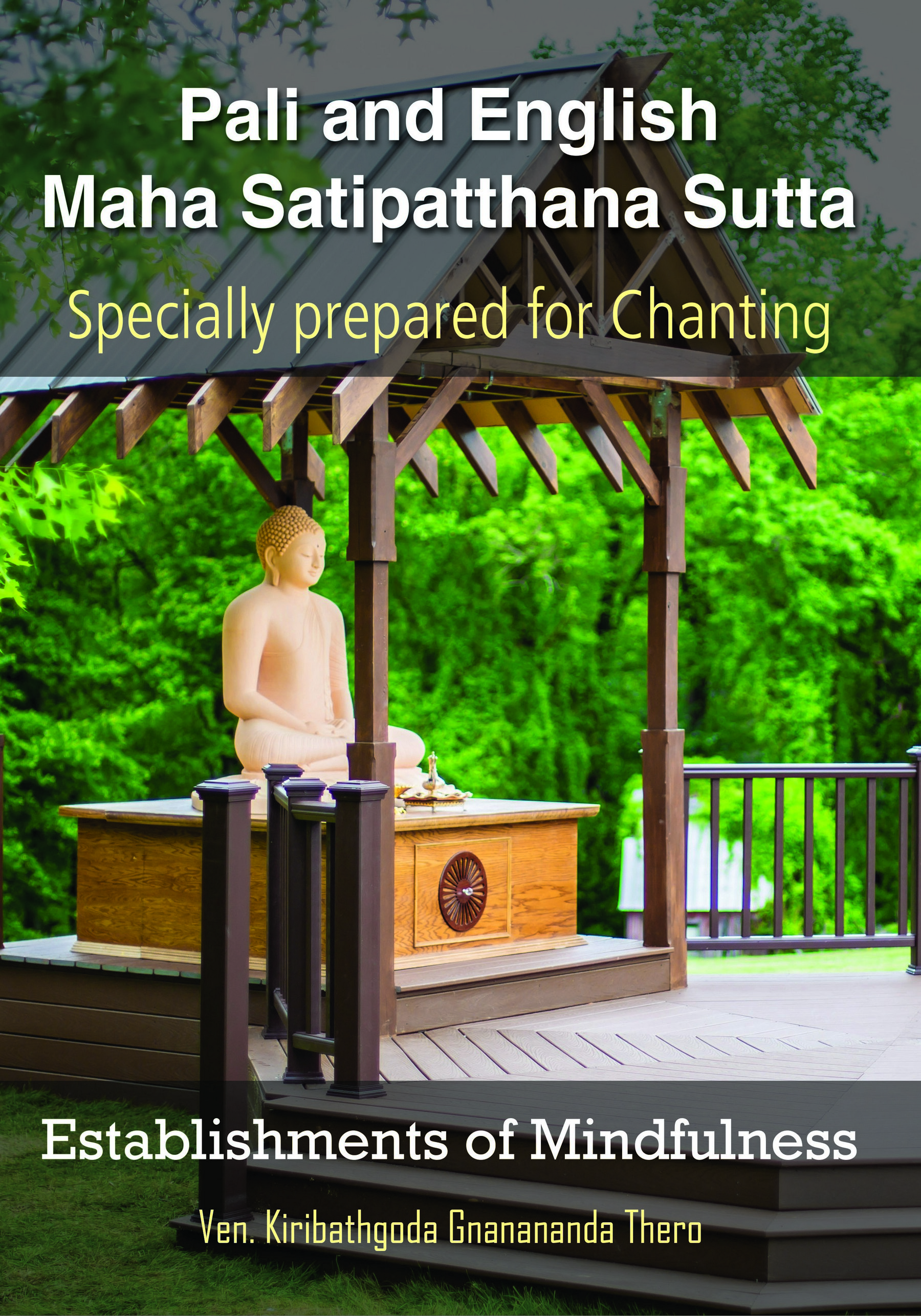1.1 Ānāpāna Pabbaṁ: Section on Breathing
Kathañca bhikkhave bhikkhu kāye kāyānupassī viharati?/
“How, monks, does a monk dwell contemplating the body in body?
Idha bhikkhave bhikkhu/ araññagato vā rukkhamūlagato vā suññāgāragato vā/ nisīdati pallaṅkaṁ ābhujitvā,/ ujuṁ kāyaṁ paṇidhāya/ parimukhaṁ satiṁ upaṭṭhapetvā./ So sato’va assasati,/ sato’va passasati./ Dīghaṁ vā assasanto, dighaṁ assasāmīti pajānāti./ Dīghaṁ vā passasanto, dīghaṁ passasāmīti pajānāti./ Rassaṁ vā assasanto, rassaṁ assasāmīti pajānāti./ Rassaṁ vā passasanto, rassaṁ passasāmīti pajānāti./
Here monks, a monk, gone to the forest or to the foot of a tree • or to a secluded place, • sits down folding his legs crosswise, • holding his body straight, • and setting mindfulness on the meditation object. “Mindful he breathes in, mindful he breathes out.“When breathing in a long breath, he knows, • ‘I am breathing in a long breath.’ When breathing out a long breath, he knows, • ‘I am breathing out a long breath.’“When breathing in a short breath, he knows: • ‘I am breathing in a short breath.’ When breathing out a short breath, he knows: • ‘I am breathing out a short breath.’
Sabbakāya paṭisaṁvedī assasissāmīti sikkhati,/ sabbakāya paṭisaṁvedī passasissāmīti sikkhati./ Passambhayaṁ kāya saṅkhāraṁ assasissāmīti sikkhati,/ passambhayaṁ kāya saṅkhāraṁ passasissāmīti sikkhati./
“‘Conscious of the entire breathing process, I shall breathe in,’ • thus he trains himself. Conscious of the entire breathing process, I shall breathe out,’ • thus he trains himself. “‘Calming the entire breathing process, I shall breathe in,’ • thus he trains himself. ‘Calming the entire breathing process, I shall breathe out,’ • thus he trains himself.
Seyyathāpi, bhikkhave, dakkho bhamakāro vā bhamakārantevāsī vā/ dīghaṁ vā añchanto, dīghaṁ añchāmīti pajānāti./ Rassaṁ vā añchanto, rassaṁ añchāmīti pajānāti./
“Just as monks, a skilled turner or his apprentice, • when making a long turn, understands, • ‘I am making a long turn,’ • or when making a short turn understands, • ‘I am making a short turn.’
Evameva kho bhikkhave, bhikkhu/ dīghaṁ vā assasanto, dīghaṁ assasāmīti pajānāti./ Dīghaṁ vā passasanto dīghaṁ passasāmīti pajānāti./ Rassaṁ vā assasanto rassaṁ assasāmīti pajānāti./ Rassaṁ vā passasanto rassaṁ passasāmīti pajānāti./
In the same way monks, • when breathing in a long breath, the monk knows, • ‘I am breathing in a long breath.’ When breathing out a long breath, he knows, • ‘I am breathing out a long breath.’ When breathing in a short breath, he knows, • ‘I am breathing in a short breath.’ When breathing out a short breath, he knows, • ‘I am breathing out a short breath.’
Sabbakāya paṭisaṁvedī assasissāmīti sikkhati./ Sabbakāya paṭisaṁvedī passasissāmīti sikkhati./ Passambhayaṁ kāyasaṅkhāraṁ assasissāmīti sikkhati,/ passambhayaṁ kāyasaṅkhāraṁ passasissāmīti sikkhati./
‘Conscious of the entire breathing process, I shall breathe in,’ • thus he trains himself. ‘Conscious of the entire breathing process, I shall breathe out,’ • thus he trains himself. ‘Calming the entire breathing process, I shall breathe in,’ • thus he trains himself. ‘Calming the entire breathing process, I shall breathe out,’ • thus he trains himself.
Iti ajjhattaṁ vā kāye kāyānupassī viharati./ Bahiddhā vā kāye kāyānupassī viharati./ Ajjhatta bahiddhā vā kāye kāyānupassī viharati./
“In this way he dwells contemplating his own body, • he dwells contemplating others’ bodies, • and he dwells contemplating both his and others’ bodies.
Samudaya dhammānupassī vā kāyasmiṁ viharati./ Vaya dhammānupassī vā kāyasmiṁ viharati./ Samudaya vaya dhammānupassī vā kāyasmiṁ viharati./
“He dwells contemplating the arising of the body, • he dwells contemplating the passing away of the body, • and he dwells contemplating the arising and passing away of the body.
Atthi kāyo’ti vā panassa sati paccupaṭṭhitā hoti./ Yāvadeva ñāṇa mattāya, patissati mattāya,/ anissito ca viharati./ Na ca kiñci loke upādiyati./
“Mindfulness, that there is a body • is simply established in him • to the extent necessary for higher knowledge and mindfulness. He dwells independent, and not clinging to anything in the world.
Evampi kho bhikkhave bhikkhu / kāye kāyānupassī viharati./
That is how monks, a monk dwells contemplating the body in body.
1.4 Paṭikūlamanasikāra Pabbaṁ: Section on Repulsiveness
Puna ca paraṁ bhikkhave bhikkhu / imameva kāyaṁ uddhaṁ pādatalā adho kesamatthakā/ taca pariyantaṁ pūraṁ nānappakārassa asucino paccavekkhati./ “Atthi imasmiṁ kāye, kesā, lomā, nakhā, dantā, taco,/ maṁsaṁ, nahāru, aṭṭhi, aṭṭhi miñjaṁ, vakkaṁ,/ hadayaṁ, yakanaṁ, kilomakaṁ, pihakaṁ, papphāsaṁ,/ antaṁ, antaguṇaṁ, udariyaṁ, karīsaṁ, matthaluṁgaṁ/ pittaṁ, semhaṁ, pubbo, lohitaṁ,/ sedo, medo, assu, vasā, kheḷo,/ siṁghāṇikā, lasikā, muttanti.”/
“Again, monks, a monk considers this body upwards from the soles of the feet, • and downwards from the tips of the hairs, enclosed in skin, • as full of many kinds of impurities: ‘In this body there are head hairs, • body hairs, nails, teeth, skin, • flesh, blood vessels, bones, bone marrow, kidneys, brain• heart, liver, gall bladder, spleen, lungs, • small intestine, large intestine, stomach, feces, brain • bile, phlegm, pus, blood, sweat, fat, tears, • skin oil, saliva, mucus, • fluid in the joints, and urine.’
“Seyyathāpi bhikkhave ubhato mukhā muṭoḷi / pūrā nānāvihitassa dhaññassa,/ seyyathīdaṁ,/ sālīnaṁ, vihīnaṁ, muggānaṁ, māsānaṁ, tilānaṁ, taṇḍulānaṁ./ Tamenaṁ cakkhumā puriso muñcitvā paccavekkheyya:/ “ime sālī, ime vīhī, ime muggā, ime māsā,/ ime tilā, ime taṇḍulā’ti./
“Just as though there were a bag with an opening at both ends • full of many sorts of grain, • such as hill rice, red rice, beans, peas, millet, and white rice, • and a man with good eyes were to open it and review it thus: ‘This is hill rice, this is red rice, • these are beans, these are peas, • this is millet, and this is white rice.’
Evameva kho bhikkhave bhikkhu/ imameva kāyaṁ uddhaṁ pādatalā adho kesamatthakā / taca pariyantaṁ pūraṁ nānappakārassa asucino paccavekkhati:/ atthi imasmiṁ kāye kesā, lomā, nakhā, dantā, taco,/ maṁsaṁ, nahāru, aṭṭhi, aṭṭhimiñjaṁ, vakkaṁ,/ hadayaṁ, yakanaṁ, kilomakaṁ, pihakaṁ, papphāsaṁ,/ antaṁ, antaguṇaṁ, udariyaṁ, karīsaṁ, matthaluṁgaṁ/ pittaṁ, semhaṁ, pubbo, lohitaṁ,/ sedo, medo, assu, vasā, kheḷo,/ siṅghānikā, lasikā, muttanti.”/
In the same way , monks, a monk considers this body upwards from the soles of the feet, • and downwards from the tips of the hairs, enclosed in skin, • as full of many kinds of impurities: • ‘There are in this body head hairs, • body hairs, nails, teeth, skin, • flesh, blood vessels, bones, bone marrow, kidneys, • heart, liver, gall bladder, spleen, lungs, • small intestine, large intestine, stomach, feces, brain • bile, phlegm, pus, blood, sweat, fat, tears, • skin oil, saliva, mucus, • fluid in the joints, and urine.’
Iti ajjhattaṁ vā kāye kāyānupassī viharati./ Bahiddhā vā kāye kāyānupassī viharati./ Ajjhatta bahiddhā vā kāye kāyānupassī viharati./
“In this way he dwells contemplating his own body, • he dwells contemplating others’ bodies, • and he dwells contemplating both his and others’ bodies.
Samudaya dhammānupassī vā kāyasmiṁ viharati./ Vaya dhammānupassī vā kāyasmiṁ viharati./ Samudaya vaya dhammānupassī vā kāyasmiṁ viharati./
“He dwells contemplating the arising of the body, • he dwells contemplating the passing away of the body, • and he dwells contemplating the arising and passing away of the body.
Atthi kāyo’ti vā panassa sati paccupaṭṭhitā hoti./ Yāvadeva ñāṇa mattāya, patissati mattāya,/ anissito ca viharati./ Na ca kiñci loke upādiyati./
“Mindfulness, that there is a body • is simply established in him • to the extent necessary for higher knowledge and mindfulness. He dwells independent, and not clinging to anything in the world.
Evampi kho bhikkhave bhikkhu / kāye kāyānupassī viharati./
That is how monks, a monk dwells contemplating the body in body.

